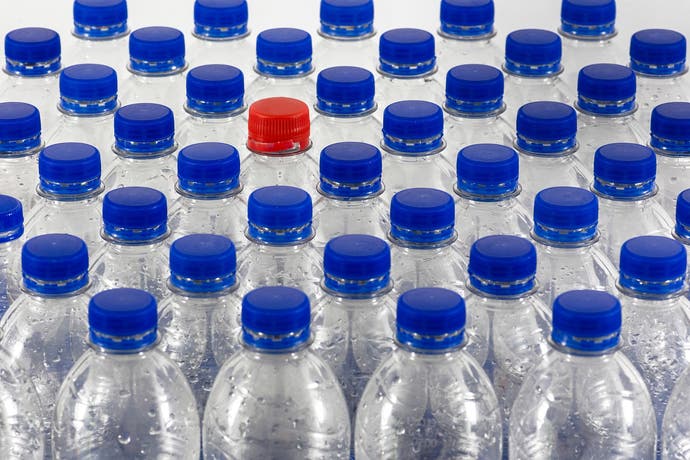The inescapable impact of plastics in the video game industry
And what key players are doing about it.
Ed Annunziata loves the ocean.
"I can hear the waves right now!" he tells me from his home on the coast of Northern California. "I knew when I moved from New York that I needed to live by the ocean. I've always been enthralled by the dichotomy of its beauty and the dangers it harbors. What's more terrifying than something swimming from the darkness towards you? Yet, what's more gorgeous than a coral reef teeming with life?"
It's an idea reflected in Annuziata's games, most notably, Ecco, his beloved series about a dolphin fighting to save the ecosystem and his species from mysterious aliens and human oppression. It is often considered one of the first environmental ocean games, but even Ecco couldn't predict the threat that would be posed by plastic pollution.
"When I walk on the beach I see plastic bottles and wrappers left behind by weekend beach visitors," says Annunziata. "It's heartbreaking to see knowing that plastic trash will be floating around in the ocean for 1000 years."
Plastic is a problem, and the same is true for the video game industry. Whether it's our consoles, our PCs, our game packaging, or just a water bottle you happen to throw away at a convention - it isn't solely our responsibility, but we undoubtedly bear some of the blame.

"Plastic is useful. It's hard wearing. It's safe. It's known. The manufacturers are known. The costs are known. The retailers can rack it and stack it. It's used everywhere," explains Miles Jacobson, studio director of Sports Interactive. "Physical games are not the only place in the chain where plastic is used. And it's crazy to think that game downloads equals no plastic. There is plastic in your consoles, your computer, your modem, the cables. Plastic is everywhere. And, again, it's useful."
In 2019, Sports Interactive in partnership with Sega, made their stand on plastic, saving 20 tonnes through environmentally friendly packaging for their physical release of Football Manager 2020. This eventually led to Sega's announcement that all of its European PC releases will now adopt that packaging.
"We used reinforced recycled card, recyclable shrink wrap using a material called LDPE (low density polyethylene) which can be collected at kerbside by most councils in the UK, printed with vegetable and water-based inks, and recycled paper for the manual. So, if you take the disc out, you can pop the rest into your home recycling bin," explains Jacobson. "We also had to ensure that the data on the discs was safe, that it looked nice in people's collections and on retail shelves with no need for the retailers to re-rack their stores. We also hope that the reduction in weight means that it becomes more eco-friendly to transport our games around the world too."

Though a positive step for the industry, the production of environmentally friendly packaging presents difficulties of its own, such as cost. Football Manager 2020's packaging was 30% more expensive to produce, but Sega reports that this increase is offset to some extent by reduced fuel costs due to weight in transportation, and reduced destruction costs due to its recyclability. Manufacturing is also a significant consideration. Gaming peripheral companies, ABP & A4T, also partnered in 2019, but with an even more extreme approach, saving 60 tonnes of plastic by redesigning their 4Gamers and Stealth product packaging to be 100% plastic free, in a process that took over a year of preparation and research.
"Overall, we saw limited financial impact on the business. It was a joint venture with our factories to find sustainable packaging resources; ones that didn't compromise product quality within our costing models. Arguably, the biggest cost to the business was in time invested towards sourcing new suppliers and testing those new materials," says Laura O'Donohue, ABP's Head of Commercial. "It's a change that all of ABP agreed needed to happen and, actually, any way that we can help or advise competitors to do the very same thing, we will. The fewer companies in the games industry (or any industry) churning out plastic packaging, the better."
In one year, a football management simulator and two relatively small gaming accessory companies saved 80 tonnes of plastic from filling landfills or littering the ocean, without a huge impact to their profit. Consider how much Sony, Microsoft or Nintendo could save if they changed their packaging? And more importantly, why haven't they? Laura O'Donohue speculates it might be the bottom line, and the accountability of CEOs to shareholders - that it requires a collective decision, which also has to be a binary one, because, as O'Donohue states: "you basically need to put the planet before profit." But Jacobson thinks it's likely also a matter of the time it takes to implement the changes.
"If every games, music and film company switched, it would be millions of tonnes a year. And I still believe that it will be - the way we are set up with Sega means that we can be incredibly nimble as a business, whereas for most larger companies, and even Sega as a whole, they can't move as quickly as we have. Our packaging solution is more expensive than the standard, and many departments in large companies will simply be told 'no' by the accountants when they want to spend more. But there are lots of discussions going on across entertainment industries and including many very large retailers, about more eco-friendly packaging. But while I'm frustrated by the speed and time it will take, I'm very encouraged by the conversations that I've been involved in and I do think that things will change pretty quickly for a corporate environment."

Perhaps due to consumer pressure and their nature as people led events, gaming conventions are an area where these conversations of sustainability seem to have taken hold. A significant number of both events and venues have imposed sustainability practices ranging from recycling food waste, to energy efficiency, to recyclable system construction for convention stands.
"Plastic is one very important part of overall waste production, which can be staggering at large-scale events like ours," explains Susanna Pollack, president and producer of the Games for Change Festival, the largest gaming event in New York. "It all starts with very critical thinking about what ends up in the hands of our attendees, be that a plate, a program, a badge. In the past, it was easy to justify each of these single-use plastics given their added 'convenience' to attendees, but we have increasingly found that the audience responds positively to steps taken to reduce plastic use, especially as more attendees grow conscious of their own consumption. The most important thing to do is think creatively and critically about what you are putting in peoples' hands, and whether or not there might be a more sustainable alternative. However, it always helps to align yourself with stakeholders who feel just as strongly: ask your venue about their recycling workflows, or ask your caterers about alternative utensils."
Games for Change's work with Boxed Water and ban on single-use plastics is just one example of many game convention sustainability initiatives. At Microsoft's Future Decoded in London, drinking plastics were replaced with china cups and glass bottles and the carpets used during the event were recycled afterwards. Many venues are also pursuing similar practices, including ExCel London's collaboration with retailers to offer discounts to customers with reusable coffee cups, or Koelnmesse's focus on resource efficiency, with 90% of waste being sent for recycling, removal of unnecessary carpets and providing disposal alternatives made from bioplastics like PLA. It's still important to remember that the people with the most power to affect the sustainability of conventions are us - whether in regards to bringing reusable drinkware, or in disposing of waste correctly.
Many of these significant conversations in regards to environmental practice and sustainability have happened as part of Playing4thePlanet, an alliance co-founded by UN Environment, GRID-Arendal and Playmob, which has seen commitments from across the games industry. These include Sony's promise to introduce a low power suspend mode for the PS5, Microsoft expanding its ongoing commitment to carbon neutrality, major tree-planting initiatives from Green Man Gaming, but most interesting of all, the introduction of 'green nudges' acknowledging the influence games have on our perception of the world, and so trying to foster environmentally positive values through them. But Playing4thePlanet isn't an organisation which seeks to push its companies into compliance, but rather inspire them with the scope of the challenge.
"It's less like driving, than like gardening," explains Dr. Trista Patterson, author of P4P. "We need to seed the important conversations, create fertile conditions for especially the first ones to push up and start to grow, call attention to the factors that have helped that emergence, as well as barriers, encourage innovators and collaborators, and call upon those who have networks, motivations, and who are similarly inspired. It's important that this is a positive, organic, and voluntary process and for it to be as rewarding for each participant as it is fun, because it represents an enormous and meaningful challenge. The cross-fertilization both within companies, and between companies (even in such an ultra-competitive industry) is really fertile ground for not just win-wins, but win-win-win PLUS planetary wins. If P4P can support the emergence of that over time, I will be most proud."
Playing4thePlanet has garnered some incredible commitments in regards to carbon reduction and climate change, but less so in terms of plastics. Currently, Sports Interactive's packaging commitment is the only one that actually makes explicit reference to plastics. In late 2019, Sony launched their own initiative in the 'One Blue Ocean' project, with the aim of reducing single-use plastics in the workplace and to some extent in their packaging across the entire company. Sony also aims to reduce the amount of virgin oil-based plastics per product unit by 10% in 2020, and promote design for recycling, as was relayed to me by Sony corporate. Over the PS4's lifetime, aspects of its sustainability have also improved, including the replacement of its internal packaging with cardboard, and along with Nintendo, labelling of plastic components to aid in recyclability. But consoles still continue to reflect our industry's greatest environmental concern.

The Xbox X series massive size and potential increased power consumption of 67% spark worries about their drive for performance, and could be seen as an unusual move considering Microsoft's recent commitment to be carbon negative by 2030. And in terms of an eye-opening environmental accounting/deconstruction of the PS4, Lewis Gordon did just that for The Verge. As Gordon illustrates perfectly in that article, an understanding of the entire process, from production to waste management is vital for consumers, both in terms of voicing feedback and holding companies accountable for their environmental practices. It can often feel that as consumers, we have no power to impact corporate process, but that couldn't be further from the truth.
"People forget that they really vote with their purchases, and this vote is amplified when they explain to others their decisions, and the things they are excited about with respect to a company or product," says Trista Patterson. "We see that with Playing4thePlanet's early adopters, there has been a lot of sentiment observation, so detailed, informed, positive feedback is really noted. A very well written and researched blog post, using the right hashtags, targeting a very specific knowledge gap and offering possible solutions (not just criticism), can have as much corporate impact as 10 mainstream media articles. I've seen it happen."
It is within our power to hold companies accountable, and we should, because now is a more important time than ever to do so. The desire for alternatives and sustainability across the games industry is plain to see, as well as the inter-company collaborations that organizations like Playing4thePlanet reflect. If you consider that most of the events I've mentioned here have occurred within the past 5 months, it's easy to recognize that plastic in our industry is at a turning point, that attitude can transform into widespread action.
"As far as the future goes, I certainly have noticed a tidal shift in the 'acceptability' of speaking about climate and environment goals within corporate objectives. CEOs have stated that while they may have been investing in innovation and impact or efficiency goals for a long time, they didn't feel comfortable having that be part of their public platform until about the past year. It was certainly easier for CEOs to speak as many, than just one," reflects Trista Patterson. "People forget that these CEOs are humans with kids, grandkids, with friends, family and colleagues all over the globe. Scientific consensus is very clear to them, they see climate and other issues playing out in headquarters and their company holdings all over the world, and increasingly being incorporated into company risk assessments, financial statements, and balance sheets. I've heard lots of CEOs expressing thanks for the opportunity to create more good in the world, and also gather with some galaxy-brain peers to see what more they might tackle."
If anything, Sega's announcement proves that the big companies no longer have any excuse for not actioning proven environmentally friendly alternatives. The only consideration should now be the time it will take for them to be implemented. Many companies might already be in the process of making those changes, but I don't think that means we as consumers should inherently trust that they are.
If these initiatives show one thing, it's that change requires individuals who are willing to stand up - CEOs and companies who will make that 'binary choice' as Laura O'Donohue calls it, to place the environment before profit, or indeed, any other difficulty they might face: whether shareholders, consumer sentiment, or simply waiting for support. "It's a price worth paying," says Miles Jacobson, "to help secure the planet's future."


